Key findings of UKPIA’s ‘Future of Mobility in the UK’ report:
- The role of the UK’s forecourts in acting as hubs for road transport re-energising will remain as the UK transport sector evolves.
- To meet Net-Zero, all stakeholders must work together in pursuing all technology options for transport decarbonisation.
- A systems approach that considers lifecycle analysis of transport GHG emissions as well as transport energy provision, storage, and conversion demands should be essential ingredients in a transport decarbonisation strategy.
- A mobility paradigm shift is required to meet Net Zero with new technologies and models disrupting existing mobility offers and improving transport energy efficiency.

The role of the UK’s forecourts in acting as hubs for ”road transport re-energising” will remain as the UK transport sector evolves, according to a new report from the UK Petroleum Industry Association (UKPIA).
However, there will be changes in the consumer experience and supply of different energy products to meet demand. These will take the form of community-serving mobility hubs with EV chargers, other transport links, community information, parcel lockers, and fresh groceries.
It cites early examples of a forecourt energy ‘pivot’ as Shell’s forecourt in Fulham, London, which has ceased the retail of liquid fuels and is undergoing refit to become an EV charging site. Similarly, the new, purpose-built Gridserve ‘electric forecourt’ offering 30 chargers alongside a supporting retail experience, which recently opened in Braintree, Essex, with plans for a network of around 100 similar sites.
The report also states that advances in the future of mobility in the transport sector include the use of hydrogen fuel cells to reduce emissions for “hard-to-decarbonise” transport such as HGVs.
The report -‘The Future of Mobility in the UK’ - considers the emerging trends, technologies and paradigm shifts that can combine to deliver a decarbonised transport sector in the UK.
It is the first dedicated report by UKPIA on the future of transport in the UK, revealing that the downstream oil sector – the supplier of 96% of the UK’s transport fuels – is committed to decarbonisation of the transport system and can be an important ally in meeting Net Zero.
Key findings include the fact that to meet Net Zero all stakeholders must work together in pursuing all technology options for transport decarbonisation.
A systems approach that considers life-cycle analysis of transport GHG emissions as well as transport energy provision, storage, and conversion demands should be essential ingredients in a transport decarbonisation strategy.
The report also concludes that a mobility paradigm shift is required to meet Net Zero with new technologies and models disrupting existing mobility offers and improving transport energy efficiency.
It claims the UK downstream oil sector has a lot to contribute to decarbonisation of transport, with UKPIA members currently investing in changes that can decarbonise transport such as EV chargers at forecourts and in dedicated hubs, as well as delivering millions of litres of biofuels every year.
The report highlights, however, that in order to meet Net Zero, governments, vehicle manufacturers, energy suppliers and all other transport stakeholders will need to work together to deliver the many solutions needed to get the UK economy carbon neutral
UKPIA director-general, Stephen Marcos Jones, said: “This technical report considers the transport sector today and what must change to achieve Net-Zero. It is not just new technologies we need but also understanding when and where to deploy them alongside usage and behavioural changes on the UK’s decarbonisation journey. This report and its findings demonstrate our sector’s integral role as the UK’s primary transport energy provider and why we must be considered a partner in shaping its future.
“Transport is the UK’s biggest carbon-emitting sector and decarbonising it is a major challenge to overcome in order to meet Net Zero. Electrification of cars and vans is already being strongly pursued by Government, but in heavier road vehicles, construction, as well as aviation and maritime, we will need a wide range of new technologies, efficiencies and new ways of working to decarbonise effectively.”

































No comments yet